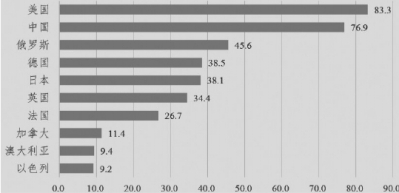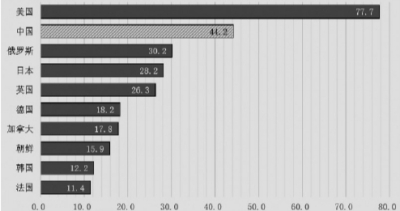Public surveys in China and the United States show that the optimism of China respondents far exceeds that of the United States.

Top 10 World Powers in China’s Public Eyes (Unit:%)

On the morning of June 30th, the National Institute of Communication Strategy of Huazhong University of Science and Technology and the People’s Think Tank of People’s Daily published the results of "A Survey on the World Concept of the Chinese and American Public (2017-2018)". The survey was conducted from October 2018 to November 2018, and was conducted by professional survey companies in the form of online questionnaires. The respondents were adult citizens of China and the United States, and 2,500 and 2,562 questionnaires were successfully collected respectively.
The National Institute of Communication Strategy of Huazhong University of Science and Technology was established in June, 2013. Since 2014, it has launched the Survey on the World Concept of Chinese and American Public, and since 2016, it has published the National Image Communication Report of China every year. Dean Zhang Kun introduced that the survey asked the Chinese and American public about the diplomacy, geopolitics and global power pattern of today’s great powers from six dimensions: the view of great powers, the view of the United States (China) and the view of national identity, and generally described the "world concept" or "world imagination" of the Chinese and American public. Based on the survey data of the two countries, the research group found some noteworthy phenomena.
Each regards the other country as a global power.
China’s top ten world powers are the United States, China, Russia, Germany, Japan, Britain, France, Canada, Australia and Israel. The top ten world powers in the eyes of the American public are the United States, China, Russia, Japan, Britain, Germany, Canada, North Korea, South Korea and France.
The data shows that Chinese and American respondents regard each other’s country as a global power. However, the respondents in China think that China is slightly higher than the United States in the status of a political power, but slightly inferior to the United States in economic, military, scientific and technological aspects; American respondents believe that the United States is ahead of China in politics, economy, military affairs and science and technology. In the expectation of the future, the self-confidence and optimism of China respondents far exceed that of the United States. 57.7% of China respondents are confident that the overall level of social development in China will surpass that in the United States; American respondents generally affirmed the strong development momentum of China, among which 45.5%, 40.8% and 30.7% thought that China had surpassed or would surpass the United States in science and technology, economy and military affairs respectively.
The American public still does not know enough about China.
The data shows that there is an obvious gap between Chinese and American public’s understanding of each other’s countries. The American public’s willingness to know information about China is relatively low, while the China public’s understanding of the United States is higher. Less than 40% (36.4%) of the American public said that they knew China very well or well, while nearly 10% (9.8%) of the respondents knew almost nothing about China.
"Sino-US trade friction" is harmful to both sides.
Generally speaking, the respondents showed a significant negative attitude towards the "Sino-US trade war". 43.5% of the respondents believe that the economic and trade friction between China and the United States will bring negative effects on global economic growth. About 40% of the American public believe that "Sino-US trade friction" is harmful to the social development of both the United States and China.
China respondents are more proud than the United States.
The data shows that there is a big gap between China and the United States in terms of social trust and national pride. American respondents are more likely to feel distrust of the people they contact in society. The national identity of China respondents is quite remarkable, with the average score of national pride as high as 4.25, while that of American respondents is 3.87.
The American public’s praise for China is especially reflected in the fields of economy and science and technology. Nearly a quarter of the respondents believe that China’s scientific and technological level will be better than that of the United States, and 21.4% of the respondents even believe that China’s scientific and technological strength has already overwhelmed the United States. More than one-fifth of the respondents believe that China’s economic development will surpass that of the United States in the future. Similarly, nearly one-fifth of the respondents believe that China’s overall social development and military level will also surpass the United States.
The American public’s evaluation of Trump is quite different
The data shows that the scores of Trump by the public of different races are quite different: the highest score is given by white/Caucasian respondents, and the lowest score is given by black/African-American groups. This is the same as Trump’s campaign.
There are obvious differences in Trump scores among different income groups. The higher the income, the greater the goodwill: the high-income group gave it a high score of 7.57, while the low-income group only gave it a score of 4.02. This result is different from the support groups during the campaign. According to the analysis of the report, the trade protectionism vigorously advocated by President Trump during his term of office won the general favor of high-income groups.
Trump’s rating of the American public with different education levels showed a trend of high at both ends and low at the middle. Trump’s scores of junior high school and below and graduate students and above are almost the same, with 6.54 points and 6.53 points respectively. According to the analysis of the report, Trump gained some goodwill within the elite group, breaking the situation that only people with low academic qualifications supported during the campaign.
Reporter Zhu Jianhua Yang Jiafeng